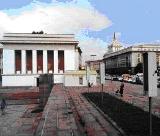Let us take a look at the following important dates and occurences that marked and characterized the political state of play in Bulgaria over the last 17 years:
• November 10th, 1989: After intense domestic and international pressure, the Bulgarian Communist dictator Todor Zhivkov resigned. Under Zhivkov Bulgaria’s policy toward Western Europe and the United States was determined largely by the position of the Soviet Union. His ruling marked decades of complete isolation from the West. Zhivkov relinquished control, and democratic change began In general, Bulgaria has suffered the usual problems experienced by centrally planned economies adjusting to market conditions and this is still one of the biggest challenges for the Bulgarian economy.
• The year 1991: Following a period of social unrest and adoption of a new constitution, the first fully democratic parliamentary elections were held and the Union of Democratic Forces won. The first direct presidential elections were held the next year. Throughout the first half of the 1990s, Bulgaria was wracked by political instability and labor unrest, as the country was plunged into economic crisis. Five governments held office during the next six years and Zhelev became Bulgaria’s first directly-elected president.
• The year 1997: Mass protests over economic crisis. Opposition boycotts the Parliament and calls for new elections. Bulgaria experienced a decade-long delay in its transition to a market economy. Its delay in proceeding with reforms left the country far behind other transition economies. In early 1997 the country experienced a severe economic and financial crisis.

• The year 1999: Demolition of the marble mausoleum of the first communist leader Georgi Dimitrov, which may be interpreted as a symbolic denial of communist values and a protest against the political system
• December 1999: Following the Helsinki European Council’s decision, accession negotiations were opened in February 2000 and Bulgaria provisionally closed all remaining chapters on 15 June 2004 on the occasion of a meeting of the Accession Conference at Ministerial level in Luxembourg.
• June 2001: Former King Simeon II’s party, the National Movement Simeon II, won parliamentary elections and its victory changed the political model consisting of right and left parties. Several months later thousands marched through Sofia on 100th day of Simeon’s premiership, saying he has failed to improve living standards.
• November 2001: Socialist Party leader Georgi Parvanov wins presidency in an election with the lowest turnout since the fall of communism. He vows to improve people’s lives and to speed up EU and NATO entry.
• March 2004: Bulgaria joined NATO and it was a political victory for Bulgaria as from our perspective the Atlantic Alliance has a major political role in consolidating freedom and democracy throughout Europe, as well as in fostering vibrant market economies and bringing economic prosperity to the people.
• April 25th, 2004: Treaty of Accession of Bulgaria and Romania to the EU was signed in Luxemburg. Bulgaria signed the treaty, putting it on course to join in 2007 provided reforms are implemented in time.
• The year 2005: Parliamentary elections. The current governmental coalition is made of the Bulgarian Socialist Party (BSP), National Movement Simeon II (NMS) and the Movement for Rights and Freedoms (representing mainly the Turkish minority).
To sum up, the most significant events for Bulgaria that formed the political profile in the last decade are the transition to market economy, the transition to democracy, the EU integration process and Bulgaria’s accession to NATO.
Bulgaria has put many efforts to catch up with EU criteria and me, as well the Bulgarian society hope that our country will become a full-fledged member and will play its important role as a reliable partner in the future development of European Union. In spite of the educational and the informational campaigns and the high level of Euro positivism among Bulgarian citizens there is still euro-skepticism.
As a young person and a JEF member, I would like to do my best in order to ensure people that Bulgarian membership in European Union does not mean only a monetary union and a single market, but also common values, which have to be shared. Values, such as belief in human rights, social solidarity, tolerance and the respect for cultural, linguistic and religious diversity.
Finally, I would like that the date 9th of May would be more famous among Bulgarians as the Day of Europe and not the day of when the Russian army was victorious over Nazi-Germany. And I am positive that this will be the case in the future.


Follow the comments: |
|
